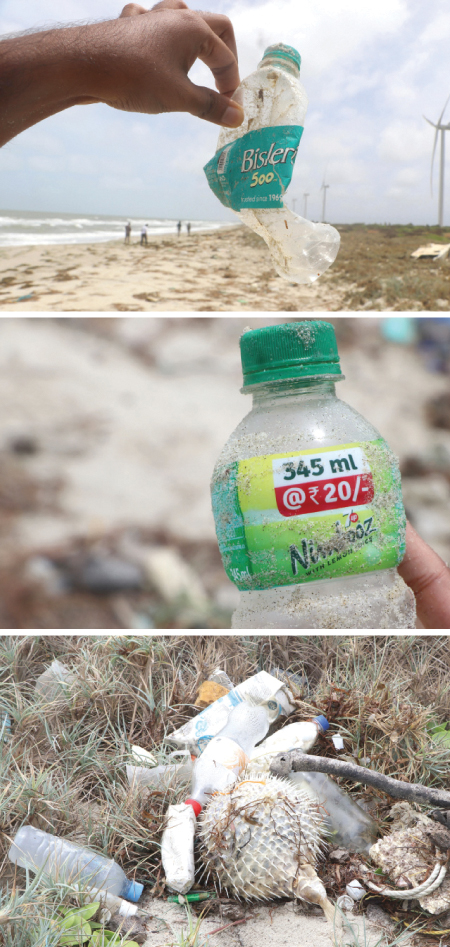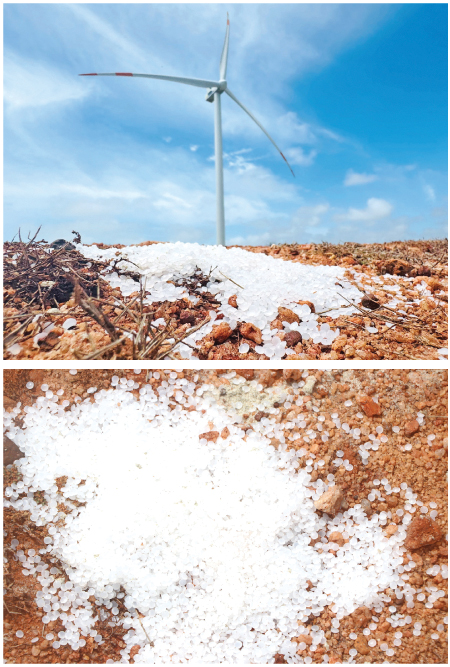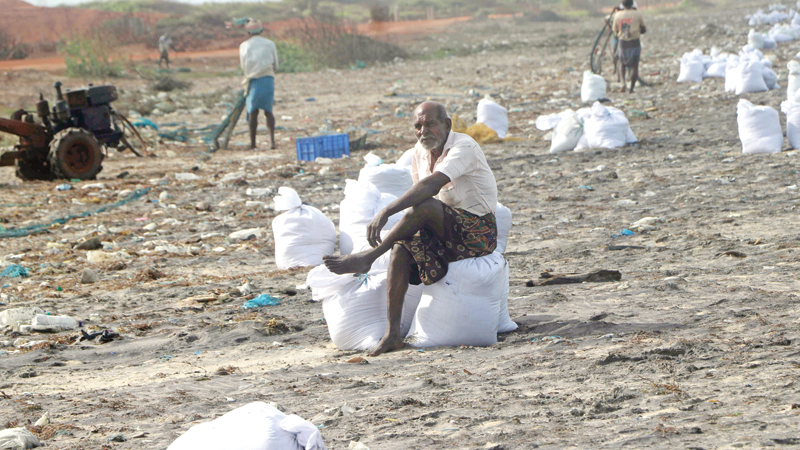 On May 25, 2025, the Liberian-flagged cargo ship MSC ELSA 03 sank approximately 38 nautical miles southwest of Kochi, India. Carrying 643 containers—including over 60 filled with plastic pellets known as “nurdles” and several others containing hazardous chemicals such as hydrazine and calcium carbide, the incident rapidly escalated from a shipping accident into a significant environmental disaster. Ocean currents spread the spilled plastic pellets and debris across the Indian Ocean, ultimately reaching the shores of Sri Lanka.
On May 25, 2025, the Liberian-flagged cargo ship MSC ELSA 03 sank approximately 38 nautical miles southwest of Kochi, India. Carrying 643 containers—including over 60 filled with plastic pellets known as “nurdles” and several others containing hazardous chemicals such as hydrazine and calcium carbide, the incident rapidly escalated from a shipping accident into a significant environmental disaster. Ocean currents spread the spilled plastic pellets and debris across the Indian Ocean, ultimately reaching the shores of Sri Lanka.
The environmental impact has been severe. Plastic pellets and marine debris from the wreck have washed ashore along nearly 600 kilometers of Sri Lanka’s western, northwestern, and northern coastlines. Affected areas include Mannar, Delft, Nainativu, Jaffna, Kalutara, Mount Lavinia, Negombo, and even Ambalangoda. In Mannar, the discovery of dead sea creatures such as Porcupine fish and Jellyfish alongside the nurdles has sparked serious concern among environmentalists and local coastal communities.
Though small and seemingly harmless, these plastic pellets pose a significant threat to the environment. They can transport toxic chemicals into the ocean, combine with other marine debris, damage fragile ecosystems, and ultimately enter the food chain. For Sri Lanka, where millions depend on the sea for their livelihoods and sustenance this is more than an environmental crisis, it is a matter of national security, economic stability, and international responsibility.
Plastic pellets
For weeks, fishermen in Mannar have reported large quantities of plastic pellets washing ashore. While some were aware of the marine accident in Indian waters, many others remained unaware of the origin of the pellets now scattered across coastal areas such as Naddankuda, Keeri, and Vankalai. In response, coastal security personnel and the Sri Lanka Navy have been working jointly for several weeks to collect the pellets and carry out cleanup operations.

However, most fishermen admitted they were unaware of what the pellets were or how harmful they could be. When asked if the pellets had affected their fishing activities, many said they had not observed any immediate impact so far.
But what the fishermen do not know is that nurdles can have long-term and devastating effects on marine ecosystems and by extension, on their livelihoods. These plastic pellets can absorb and transport toxic chemicals, contaminate fish and other seafood, and degrade critical habitats like coral reefs and mangroves. Fish and other marine animals often mistake nurdles for food, leading to internal blockages, starvation, or poisoning. Over time, this can reduce fish stocks and alter migration patterns, making it harder for fishermen to find viable catch. Contaminated seafood may also pose serious health risks to consumers, potentially damaging both local consumption and export markets.
Clean up efforts
Authorities have once again been forced to take on a monumental clean-up operation, reminiscent of the aftermath of the X-Press Pearl disaster. Speaking to the Sunday Observer, Mannar District Secretary K. Kanakeswaran confirmed that efforts are currently underway with the support of the Marine Environment Protection Authority (MEPA) and the Sri Lanka Navy. He noted that the recovered plastic pellets are being securely stored near a Sri Lanka Navy camp in the area, and that regular updates are being shared with the fishing community through local fishing associations and media channels.
The Northern and Eastern Provincial Assistant Manager of the Marine Environment Protection Authority (MEPA), T. Sripathy said the situation in Mannar has been brought under partial control with the support of the Sri Lanka Navy, and fishing activities are continuing as usual. However, he expressed concern about the potential long-term risks posed by the plastic pellet spill. Citing the 2021 MV X-Press Pearl disaster, Sripathy stressed the need for continued research, environmental monitoring, and increased public awareness to prevent similar long-lasting impacts.
According to the founder of the Biodiversity Project, Kasumi Ranasinghe Arachchige, plastic pollution poses not only an environmental threat but also an escalating danger to human health. She said that microplastics have now been found in human blood and internal organs. Moreover, chemicals commonly associated with plastics—such as PFAS—are known to disrupt hormones, reduce sperm count and fertility, and even elevate cancer risk.
Ranasinghe Arachchige also said the link between plastic pollution and climate change, noting that plastics are derived from fossil fuels. She drew attention to rising sand temperatures, which produce a disproportionate number of female sea turtle hatchlings and disrupt the natural sex ratio of the species. These examples underline how the ramifications of plastic pollution extend far beyond polluted beaches, threatening ecosystems and human lives in deeply interwoven ways.
In light of these growing hazards, experts are calling for the urgent enforcement of stricter regulations governing the shipping, transportation, and production of plastics and hazardous materials. Equally crucial is the establishment of a robust compensation mechanism in line with the internationally recognised “Polluter Pays” principle, to hold contaminators fully accountable.
Yet another fisheries woe
Fishermen in Mannar have long borne the brunt of two major cross-border threats: the illegal entry of Indian trawlers poaching in Sri Lankan waters, and the relentless flow of plastic waste from South India into the Palk Strait and the Gulf of Mannar. These twin crises continue to inflict lasting harm on Sri Lanka’s marine environment, especially along the Northern coastline. The recent arrival of plastic pellets threatens to further aggravate these issues, placing an even heavier burden on the livelihoods of local fishing communities.
Illegal fishing and economic displacement
One of the most urgent concerns voiced by Sri Lanka’s northern fishing communities is the illegal encroachment of Indian trawlers particularly from Tamil Nadu into Sri Lankan territorial waters. These vessels often employ banned practices like bottom trawling, which involves dragging weighted nets along the seabed. The method not only devastates fragile marine habitats but also drastically reduces fish stocks, undermining long-term sustainability.
As detailed in the Sunday Observer’s recent reporting from Delft, local fishermen shared harrowing accounts of their nets being slashed and boats damaged during encounters with better-equipped Indian vessels. These trawlers, often outfitted with more powerful engines and modern gear, dominate the seascape, leaving Sri Lankan fishermen hesitant to venture far from shore for fear of confrontation and loss.
The economic toll of this illegal activity is severe. Fisherfolk lose access to their primary resource, suffer recurring damage to their gear, and see their incomes steadily eroded. The Northern Province, home to over 400,000 people relies heavily on marine-based livelihoods.

According to Sri Lanka’s Department of Fisheries, more than 30 percent of the region’s population is directly or indirectly dependent on the fisheries sector. The destruction caused by foreign trawlers thus ripples across the local economy, impacting fish processors, net repairers, seafood transporters, and countless others along the value chain.
Plastic pollution from India
Compounding the threat of illegal fishing is the relentless influx of plastic waste from South India. Each year, tonnes of plastic bottles, bags, food wrappers, and microplastics drift across the Palk Strait, driven by ocean currents and the Southwest Monsoon, to wash up on the northwestern shores of Sri Lanka, especially along the Mannar coastline.
During the Sunday Observer team’s visits to the beaches of Nadukkadu, Keeri, and Vankalai, it saw first-hand the scale of this pollution. Locals pointed to plastic debris often marked with Tamil and Hindi writing entangled in fishing nets or embedded in the sand. This transboundary pollution directly disrupts fishing activities, damages marine ecosystems, and contaminates the coastal environment.
For the communities of the Northern Province, the impact is profound. Plastic pollution not only chokes marine life and damages coral reefs, but also disrupts fish breeding cycles and renders key fishing grounds increasingly unproductive. What’s more, these environmental stresses disproportionately affect already vulnerable populations who depend on clean waters for both nutrition and income further widening the gap between ecological harm and economic recovery.
A question of rights and responsibility
There is a painful irony at play. Speaking to the Sunday Observer, fisheries rights activists in the North pointed out that while Indian politicians often raise concerns in Tamil Nadu and the Lok Sabha in New Delhi about the political rights of Sri Lanka’s Tamil population, their inaction on environmental and maritime responsibilities is quietly undermining the economic rights of those very same communities.
By turning a blind eye to illegal fishing practises by South Indian trawlers and failing to manage the coastal waste pouring into Sri Lankan waters, Tamil Nadu authorities endangering the livelihoods of tens of thousands of Northern Sri Lankans. The damage is not abstract, it is seen in slashed nets, depleted fish stocks, polluted marine ecosystems, and beaches buried in plastic. These slow, sustained impacts are stripping coastal communities of both their economic security and their dignity.
The damage is deeply personal for people like Selvaratnam Dilaxan, a young activist from Mannar.
“Every year, tons of plastic waste wash up here during the southwest monsoon,” he told the Sunday Observer. “This isn’t a one-off occurrence, it has been happening for years. As a child, I remember wondering where all this waste came from. We only found out later that much of it originates from India.”
Today, Dilaxan says he no longer feels proud of the hometown he once called beautiful. “We feel like Mannar Island has become a garbage dump,” he said. “From the southern beaches of the island to Adam’s Bridge in Thalaimannar, plastic waste is everywhere. It’s hurting our fishing community and putting marine life at serious risk. We often see sea turtles wash ashore dead after consuming plastic.”
Historian, diplomatic affairs expert, and strategist Dr. George I. H. Cooke said the urgent need to protect the economic rights of fishermen in Northern Sri Lanka.
“We must prioritise safeguarding the livelihoods of Northern Sri Lankan fishermen,” he said. “Their economic rights cannot be taken away—they must be defended. The fishing nets being used by Indian fishermen in our waters are actually banned in India; such equipment is illegal in their own country.”
Cooke raised a critical question: “What will happen to the economic rights of our Northern fishermen? We cannot afford to forget them.”
He said that resolving the issue requires a diplomatic approach. “We need to address this problem through talks with India as soon as possible. Our current good relationship with the Indian Government presents a valuable opportunity to negotiate a long-term solution.”
However India has also been a steadfast friend to Sri Lanka, especially during the 2022 economic crisis, when its timely support helped us through a difficult period. India is the world’s fourth-largest economy and a rising global power, with growing influence across South Asia. As a small island nation in the Indian Ocean, Sri Lanka faces many challenges from economic difficulties to security concerns. Sri Lanka’s development and recovery depend heavily on strong partnerships. India’s support is vital, not only for tourism, trade, and investment but also for protecting our natural resources and the livelihoods of our people.
The Sunday Observer attempted to reach Minister of Fisheries, Aquatic and Ocean Resources Ramalingam Chandrasekar by phone to get the Government’s stance on the issue, but was unreachable. However, during a recent media briefing, the Minister assured the affected fishing communities in Sri Lanka that a solution to their concerns regarding fisheries issues with India will be found soon. Whether these issues will be fully resolved remains to be seen, but the fishermen will have to remain hopeful for a positive outcome.
Pix by Shabeer Mohamed








